Interview with Dimitri Nasrallah of Esplanade Books
Continuing our month-long series of Quebec literature, below you’ll find an interview with Dimitri Nasrallah, writer, translator, and editor of Esplanade Books, the fiction imprint of Véhicule Press. Later this afternoon we’ll be running an excerpt from one of their forthcoming titles.
Chad W. Post: I want to ask you about all the different things you do—write, translate, edit—but it’s probably best to start with something really simple: Could you introduce yourself and say a bit about Esplanade Fiction?
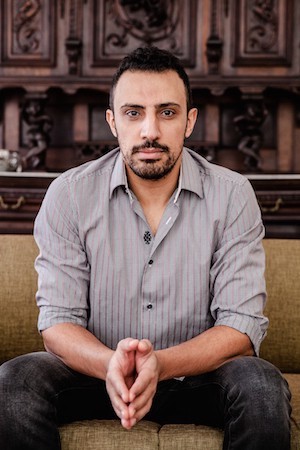 Dimitri Nasrallah: Well, I suppose the best way to begin with a question that broad is to say that I’m a writer first and foremost, that was my reason for moving to Montreal in the first place, seventeen years ago. Without digging too much deeper than that, in 2011 I published my second novel, Niko, with Esplanade Fiction, and that’s where my longstanding relationship with Véhicule Press and publishers Simon Dardick and Nancy Marrelli began. Then two years later, I received a called from Simon, inviting me to become the fiction editor of Esplanade.
Dimitri Nasrallah: Well, I suppose the best way to begin with a question that broad is to say that I’m a writer first and foremost, that was my reason for moving to Montreal in the first place, seventeen years ago. Without digging too much deeper than that, in 2011 I published my second novel, Niko, with Esplanade Fiction, and that’s where my longstanding relationship with Véhicule Press and publishers Simon Dardick and Nancy Marrelli began. Then two years later, I received a called from Simon, inviting me to become the fiction editor of Esplanade.
Esplanade had been in existence for a decade by that point, under the helm of its originating editor, Andrew Steinmetz, publishing one to two books per year. The imprint had had some successes along the way, most notably debuts by Liam Durcan, Jaspreet Singh, and Andrew Hood. The final book that Andrew had worked on was Guillaume Morissette’s debut novel, New Tab, which ended up becoming one of the imprint’s biggest sellers. Given that book’s success, a first decade in the pocket, and a new editor at the helm, it seemed like a good moment to change things up.
Following a series of discussions about the direction of the imprint, some important changes were implemented. The number of books per year jumped to four, so that the catalogue could have more consistent visibility. Also, I felt we were missing an opportunity, as a Montreal-based publisher, to take advantage of our cultural proximity to the French publishing scene and translate an exciting new generation of writers. At that point, all that work was being left to publishers outside Quebec–House of Anansi, Biblioasis, Talonbooks, Coach House, Book*hug. Now of course there’s QC Fiction and Linda Leith who both have translation programs. But at the time, the terrain was barren and I thought we could bring a different vantage point to it, and that it would carry greater meaning in the province’s cultural circles for an Anglo publisher to cross the divide and begin promoting the works of Francophone writers. So we dedicated half the catalogue to translations.
It was also quite important for me–and for Simon and Nancy–to feature a more diverse offering of writers. The problem with Quebec’s historic divide along language lines is that for generations every other cultural dynamic, especially those of minorities, gets pushed to the bottom of the conversation in favour of perpetuating the notion of “two solitudes”.
I also have a special place in my heart for short books. So when you mix all those ideas together, you get something of the reasoning behind what Esplanade has represented for the last five years.
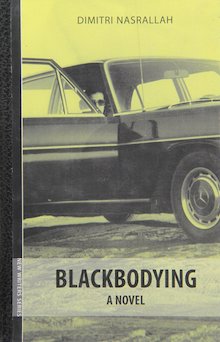 CWP: I read on the “About Us” page that you took over as the editor of Esplanade at the end of 2013, inheriting a line that was already a decade old. At the same time, you had two books out (Blackbodying and Niko), and had just been longlisted for the IMPAC Dublin Literary Award. What made you want to take over as editor? How did this impact your writing career? Were there any immediate challenges that surprised you?
CWP: I read on the “About Us” page that you took over as the editor of Esplanade at the end of 2013, inheriting a line that was already a decade old. At the same time, you had two books out (Blackbodying and Niko), and had just been longlisted for the IMPAC Dublin Literary Award. What made you want to take over as editor? How did this impact your writing career? Were there any immediate challenges that surprised you?
DN: I’ve always taken a very piece-meal approach to life in Montreal. I moved here because, back in the early 2000s, it was still a very cheap place to live, and I could largely avoid have to work a full-time job. And so from my mid-20s on, I’ve grown into this lifestyle of working on projects to support my writing. Many of those projects ended up being in either the literary and music communities, so by the time Simon asked me to become editor at Esplanade, I already had a track record in Montreal as someone who was involved in a lot of projects, was connected to a lot of different scenes, and who had done a lot of writing about books along the way.
For me, the invitation felt like an opportunity to make a different kind of impact. Anyone who knows me will tell you that I have strong opinions, especially when it comes to most things cultural. To be able to communicate a perspective from an institutional platform such as Véhicule Press, well it just seemed like a once-in-a-lifetime opportunity.
I’d say it’s had a positive impact on my writing career. One could argue that I’d have more time for writing if I wasn’t an editor, or if I didn’t start translating, but then the same can be said of having a family or any of the other million things I end up doing. I guess I’m always more satisfied at the end of the day if I’m in the thick of it. In any case, editing pollinates my own writing and gives me the opportunity to working on the complex questions that novels pose at a depth and concentration that few other writers have access to. Most writers will be made to feel isolated by their writing at some point in their lives–the space one craves can also cut them off from the world, and no amount of tweeting will remedy that.
Editing an imprint comes with many challenges, of course. I don’t think I was ready for the amount of work and delicate communication that goes into cultivating and editing the novels of other writers. But it does grant insights into one’s own process, and when you see the results of the work filter out into the world, it’s all worth it.
CWP: How would you describe the type of books that Esplanade publishes?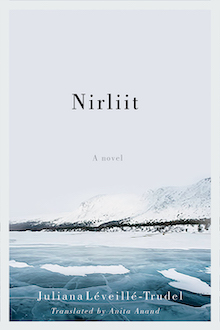
DN: I like to think that Esplanade titles are off in left field, doing their own thing. I appreciate writers who combine a sense of imaginative risk and aesthetic discipline. Simon and I share an affinity for the storied publication runs of houses like New Directions or Grove, publishers who for a time seemed to be working outside literary tradition but adding to it at the same time. I’m not terribly concerned by whatever trendy cultural conversation is going on at any given time, but that’s not to say that I’m not aware of how culture arises and its historical patterns. I do find it worthwhile to aim to put books out there that offer a new conversation, even though it may take some time for readers to figure what that conversation is and how the book fits.
CWPL One of the first Esplanade authors I came across was Éric Plamondon, whose “1984 Trilogy” you’re translating. Is this your first major translation project? What drew you to Plamondon’s trilogy? How has the experience been for you?
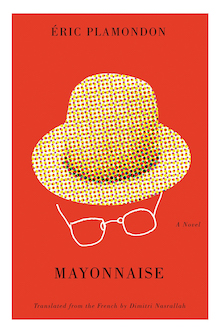 DN: Plamondon is my first major translation project, and a trilogy no less! But I spent about a decade beforehand translating cultural documents from French to English, as I built up my literary skills. It was a bit of a leap into the deep end, but then again so is every other worthwhile project I’ve taken on. For me, Plamondon’s writing is so diametrically opposed to my own that I feel I’m allowed to use muscles that my own writing would never even imagine having. It speaks to a formalist mentality that isn’t present in my work. But if I’m to be honest, I can see how the 1984 Trilogy’s approach began to find its way into my last novel, The Bleeds (2018). That cross-pollination of aesthetics is, for me, the best part of literature and culture.
DN: Plamondon is my first major translation project, and a trilogy no less! But I spent about a decade beforehand translating cultural documents from French to English, as I built up my literary skills. It was a bit of a leap into the deep end, but then again so is every other worthwhile project I’ve taken on. For me, Plamondon’s writing is so diametrically opposed to my own that I feel I’m allowed to use muscles that my own writing would never even imagine having. It speaks to a formalist mentality that isn’t present in my work. But if I’m to be honest, I can see how the 1984 Trilogy’s approach began to find its way into my last novel, The Bleeds (2018). That cross-pollination of aesthetics is, for me, the best part of literature and culture.
I have a great deal of respect for translations; they were a formidable part of my literary education. I’ve always been intrinsically drawn to novelists who have taken the time to translate another author, to make that writer part of their own work. A translation is a unique offering within a novelist’s catalogue.
CWP: For any readers unfamiliar with your list, which 3-4 titles would you recommend starting with?
DN: I’ll stick to the translations given the tenor of this interview . . .
Mikella Nicol’s Aphelia (translated by Lesley Trites) [Ed Note: See excerpt.]
Genevieve Pettersen’s The Goddess of Fireflies (translated by Neil Smith)
Juliana Leveillé-Trudel’s Nirliit (translated by Anita Anand) [Ed. Note: YES.]
David Bouchet’s Sun of a Distant Land (translated by Claire Holden Rothman)
And of course Éric Plamondon’s novels
CWP: Is there anything in particular that you think sets Quebec literature apart from other world literatures? And on a related note, is there anything in particular you’re looking for when you acquire a book for Esplanade?
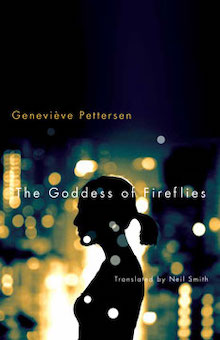 DN: Quebec literature takes imaginative and aesthetic risks, pulling in strands from both the English and French literatures of the world. Though historically it was quite the opposite and much of what was heralded here was quite culturally insular and inward-looking, that has change over the course of the past generation. My preference is for those new voices who are well-informed with what the rest of the world is up to, and who aren’t afraid to pull in aspects of those approaches into the traditional concept of a Quebecois novel. Those tend to be the features I look for when acquiring books for Esplanade.
DN: Quebec literature takes imaginative and aesthetic risks, pulling in strands from both the English and French literatures of the world. Though historically it was quite the opposite and much of what was heralded here was quite culturally insular and inward-looking, that has change over the course of the past generation. My preference is for those new voices who are well-informed with what the rest of the world is up to, and who aren’t afraid to pull in aspects of those approaches into the traditional concept of a Quebecois novel. Those tend to be the features I look for when acquiring books for Esplanade.
CWP: What’s next for the press? Do you have a vision of where Esplanade will be in five years?
DN: Five years is a long time to predict. One thing I’ve learned while editing is that you shouldn’t try to work more than 18 months in advance. Cultural tides can shift pretty quickly and it’s important to leave yourself open to working with the moment. Also, titles tend to do better when there’s an element of freshness about them. Mikella Nicol’s Aphelia is one such book I’m looking forward to seeing out in the world this spring. I’m also quite proud to be working on new fiction by poet and sound composer Kaie Kellough, due out in the fall.
Most projects that I want take years of investment. For example, I’m very excited about publishing a new translation of L’Avalée des avalés, Réjean Ducharme’s classic debut, in 2020. I chased the rights to that for well over a year. The book was published in 1966, and the only English translation that ever came out was in the UK, by Barbara Bray in 1968. It was early on in her translation career, and she ended up focusing in another direction afterward. The book did not sell well and disappeared. It hasn’t been available in English for over 50 years, and has never been available in Canada. Madeleine Stratford is translating it as I type.

[…] on this morning’s interview with Dimitri Nasrallah, below you’ll find an excerpt from Aphelia by Mikella Nicol, translated from the French […]